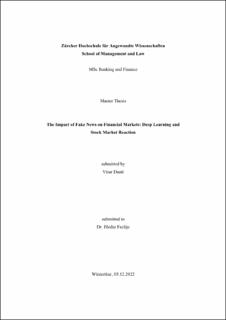Please use this identifier to cite or link to this item:
https://doi.org/10.21256/zhaw-29338Full metadata record
| DC Field | Value | Language |
|---|---|---|
| dc.contributor.advisor | Fazlija, Bledar | - |
| dc.contributor.author | Dauti, Visar | - |
| dc.date.accessioned | 2023-12-08T13:44:45Z | - |
| dc.date.available | 2023-12-08T13:44:45Z | - |
| dc.date.issued | 2022 | - |
| dc.identifier.uri | https://digitalcollection.zhaw.ch/handle/11475/29338 | - |
| dc.description.abstract | Intentionally false or misleading information or commonly described as “fake news” (FN), has received a great deal of attention in recent years and can potentially affect political or social domains. The rapid expansion of social media platforms has further driven the dissemination of misleading information across all channels. Associated with the U.S. 2016 presidential election the prevalence of FN articles may have been decisive for the election. Despite the general popularity of FN as a research focus in recent years, the amount of available detailed studies on how FN specifically affects financial securities is limited. The tenets of the efficient market hypothesis states that financial securities reflect all publicly available information and that false or misleading information should not persist in efficient financial markets. The primary objective of this thesis is to measure the price response of FN articles on financial securities and to examine whether an efficient market, based on the principles of Fama, already incorporating false or misleading news in the security price. First, financial news is retrieved from one of the largest crowd-sourced platforms. Then, the financial texts are classified into legitimate and fake articles using state-of-the-art natural language processing and Deep Learning. The algorithm is trained on a unique dataset covering different types of news. After fine-tuning the algorithm, it is applied to Motley Fool news articles. To measure the impact of FN articles on the corresponding company, an event study is conducted using the Five-Factor Model by Fama. In conclusion, the results indicate the release of FN articles is associated with negatives cumulative abnormal returns for small-cap firms. The data do not reveal in detail whether the downward trend in the market is an act of pump-and-dump scheme to manipulate the stock price or a signal of underlying poor corporate performance. The influence of FN on the price of large companies remains absent. There is a considerable return response for mid-size firms. The cumulative abnormal returns reaches a high of 7.9% after 20 days. As a result, the market is not perfectly efficient and fake information can influence the price of securities. | de_CH |
| dc.format.extent | 56 | de_CH |
| dc.language.iso | en | de_CH |
| dc.publisher | ZHAW Zürcher Hochschule für Angewandte Wissenschaften | de_CH |
| dc.rights | https://creativecommons.org/licenses/by-nc-nd/4.0/ | de_CH |
| dc.subject.ddc | 006: Spezielle Computerverfahren | de_CH |
| dc.subject.ddc | 332.6: Investition | de_CH |
| dc.title | The impact of fake news on financial markets : deep learning and stock market reaction | de_CH |
| dc.type | Thesis: Master | de_CH |
| dcterms.type | Text | de_CH |
| zhaw.departement | School of Management and Law | de_CH |
| zhaw.publisher.place | Winterthur | de_CH |
| dc.identifier.doi | 10.21256/zhaw-29338 | - |
| zhaw.originated.zhaw | Yes | de_CH |
| Appears in collections: | MSc Banking and Finance | |
Files in This Item:
| File | Description | Size | Format | |
|---|---|---|---|---|
| 2022_Dauti_Visar_MSc_BF_.pdf | 1.94 MB | Adobe PDF |  View/Open |
Show simple item record
Dauti, V. (2022). The impact of fake news on financial markets : deep learning and stock market reaction [Master’s thesis, ZHAW Zürcher Hochschule für Angewandte Wissenschaften]. https://doi.org/10.21256/zhaw-29338
Dauti, V. (2022) The impact of fake news on financial markets : deep learning and stock market reaction. Master’s thesis. ZHAW Zürcher Hochschule für Angewandte Wissenschaften. Available at: https://doi.org/10.21256/zhaw-29338.
V. Dauti, “The impact of fake news on financial markets : deep learning and stock market reaction,” Master’s thesis, ZHAW Zürcher Hochschule für Angewandte Wissenschaften, Winterthur, 2022. doi: 10.21256/zhaw-29338.
DAUTI, Visar, 2022. The impact of fake news on financial markets : deep learning and stock market reaction. Master’s thesis. Winterthur: ZHAW Zürcher Hochschule für Angewandte Wissenschaften
Dauti, Visar. 2022. “The Impact of Fake News on Financial Markets : Deep Learning and Stock Market Reaction.” Master’s thesis, Winterthur: ZHAW Zürcher Hochschule für Angewandte Wissenschaften. https://doi.org/10.21256/zhaw-29338.
Dauti, Visar. The Impact of Fake News on Financial Markets : Deep Learning and Stock Market Reaction. ZHAW Zürcher Hochschule für Angewandte Wissenschaften, 2022, https://doi.org/10.21256/zhaw-29338.
Items in DSpace are protected by copyright, with all rights reserved, unless otherwise indicated.